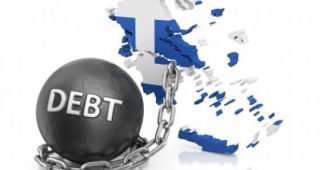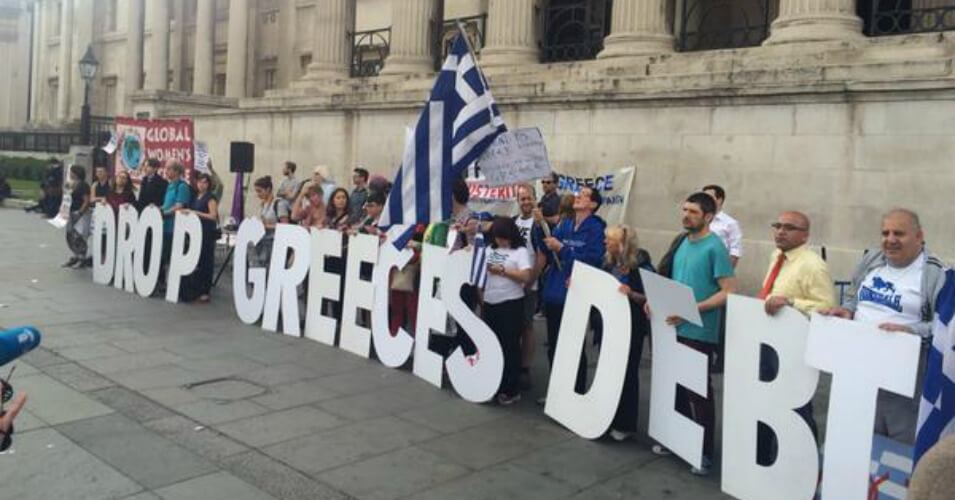Note from the author: As friends have quickly pointed out, the situation is even worse than described here. Quarterly reviews by the troika will continue. The German Bundestag will still vote on any debt deferrals, and — as I do stress — the crushing austerity will continue indefinitely. A nightmare.
By James K. Galbraith
Aug 20, 2018
2010 to 2018 will go down in Greek history as an epic period of colonization; of asset stripping and privatization; of unfunded health and education; of bankruptcies, foreclosures, homelessness, and impoverishment; of unemployment, emigration, and suicide. These were the years of the three memoranda, or “financial-assistance programs” accompanied by “structural reforms,” enacted supposedly to promote Greek “recovery” from the slump and credit crunch of 2010. They were, in fact, a fraud perpetrated on Greece and Europe, a jumble of bad policies based on crude morality tales that catered to right-wing politics to cover up unpayable debts.
Back in 2010, Greece, along with Portugal, Spain, Ireland, and Italy, was definitely in trouble. The Great Financial Crisis crashed into all of Europe, but it hit the weaker countries hardest—and Greece was the weakest of them all. Its economy shrunk by a quarter, and youth unemployment rose to roughly 50 percent. The memorandum was, for all concerned, the easy way out. It started a game of “extend and pretend” on the Greek debt, based on optimistic forecasts and on policies of reform that had no basis in the reality of Greek economic conditions.
The policies came from the IMF—its standard repertory of austerity and “reform.” But its staff and directors knew from the beginning that these measures would not suffice. IMF executive directors from Australia, Switzerland, Brazil, and China voiced objections. Channels were therefore bypassed, objections ignored. The Fund was nearly out of work and money because of the failures of its programs—and the relative success of countries that ignored them—all over the world. And its managing director at the time wished to be the next president of France. So Greece, which is to say its creditors—especially French and German banks—received the largest loan in IMF history (relative to its ownership share). And that 289-billion-euro loan came largely from U.S. taxpayers.
In Athens, teams of functionaries from the Fund, the European Central Bank, and the European Commission came to Greece, where they stayed in fancy hotels at Greek expense and were escorted by uniformed police from ministry to ministry to dictate policy in detail. (Such a nice gig, in a warm and sunny place, so close to the sea.) In 2015, they were lodged for a time in a four-star hotel, deprived of their convoys, and given protection by elite forces dressed in plain clothes. They didn’t like that at all, and their bosses, Mario Draghi and Christine Lagarde, complained loudly on their behalf.
And what of the policies? Public assets were to be dumped en masse at fire-sale prices, but only if they were already profitable. (Regional airports making losses, for example, stayed with the state.) Dutch dairies and German drug companies were taken care of. Labor markets were deregulated while collective bargaining was wiped out—an unethical experiment on an untenable premise. Neither German nor Chinese industry was moving to Greece even if the Greeks worked for free. The value-added tax was raised, pensions were cut, and hundreds of thousands of civil servants were sacked. Ministries lost cleaning ladies, who set up camp, bless them, in front of the Ministry of Finance.
The irony is that in 2012 Greece’s debts were already postponed, so that from late 2015 to 2022 there would be a grace period with relatively few major payments due. Now there is a primary-budget surplus and the markets need not be tested. So the memorandum can end, but austerity will not; the debt still looms in the long term, so the commitment to surplus extends for more than 40 years. In any event, the Greeks’ will to resistance appears to have been broken, so it seems safe enough to leave them alone. For now.
But the damage done extends far beyond Greece. The cynicism and brutality of what happened there is for everyone to see. The fact that Europe imposed a policy of privation on one of its weakest members—not for its own sake, and not with any expectation of economic success, but to intimidate the Italians and the French, as the German Finance Minister Wolfgang Schäuble conceded to the Greek Finance Minister Yanis Varoufakis privately in 2015—was not lost on British voters who chose Brexit in 2016. The Greek debacle helped to turn the French left against Europe, and fueled the inchoate coalition now in power in Italy. The German and east European far right is surely not motivated by sympathy—on the contrary, they despise the Greeks. But they do resent the supposed “solidarity”—a fiction if ever there was one—that Germany’s Chancellor Angela Merkel and her allies invoked to sell their parliaments and voters on the idea of the Greek loans.
Europe is therefore rotting at both ends. Its economy must remain unified, but it is coming apart at its political seams. It needs institutions and policies of social stabilization, financial reform, and full employment—a dramatic change in ideas and action at the continental level to thwart the rising tide of nationalist reaction. There is therefore a growing sense, among those who are watching closely, that a major democratic reform—a New Deal for Europe—is the only way to hold it together in the long run.
Published at https://www.theatlantic.com/international/archive/2018/08/greece-bailout-imf-europe/567892/











